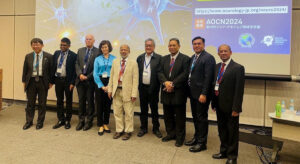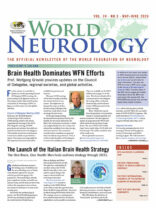A WFN-AOAN session provides a call for action to leaders in global neurology.
By Tissa Wijeratne

Participants at the WFN-AOAN session focusing on the WHO Intersectoral Global Action Plan (IGAP).
At the 65th Japanese Society of Neurology and 19th Asian Congress of Neurology (AOCN2024), the WFN-AOAN session focused on the WHO Intersectoral Global Action Plan (IGAP) and its implications, urging key opinion leaders in global neurology to take action. This session was chaired by Profs. Hamidon Basri, AOAN president, and Ryosuke Takahashi, from Kyoto University and the Japanese Society of Neurology.
WFN President Prof. Wolfgang Grisold explained the WHO IGAP to the delegates, encouraging an interactive discussion. WFN Trustee Prof. Mohammad Wasay provided insights into the status of the WHO IGAP, specifically in the Asia-Oceania region. Dr. Augustina Charway-Felli presented data on African neurology and the IGAP, highlighting regional challenges and progress.
Prof. Sarangerel Jambal, president of the Mongolian Neurological Society, gave a comprehensive overview of neurology in Mongolia, detailing the unique aspects and challenges faced in the country.
Prof. Tissa Wijeratne, co-chair of World Brain Day (WBD), traced the evolution of WBD from its inception to the upcoming WBD 2024. He emphasized the importance of embracing WBD and prioritizing preventative brain health across the region. This call for action was strongly supported by all speakers, highlighting the significant impact of advancing brain health initiatives in the Asia-Oceania region.
The session underscored the critical need for collaboration among global neurology leaders to address neurological disorders effectively. By adopting and promoting the WHO IGAP, the session aimed to mobilize efforts toward improving neurological health outcomes, emphasizing the importance of preventative measures and international cooperation. The discussions highlighted the diverse perspectives and regional insights, fostering a unified approach to tackling global neurological challenges. •
Prof. Tissa Wijeratne is co-chair of World Brain Day.
